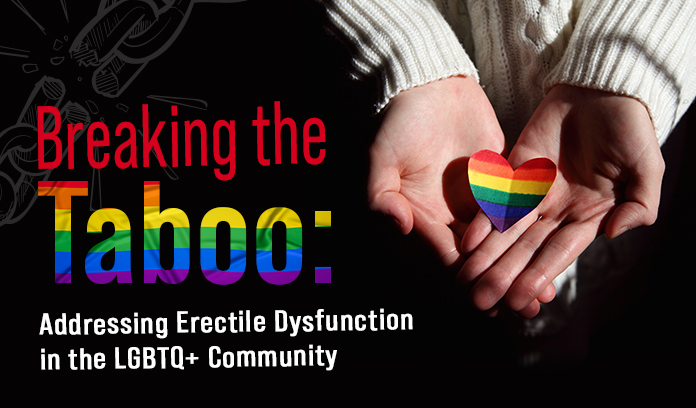Erectile dysfunction (ED) is a prevalent medical condition that affects millions of men worldwide, regardless of their sexual orientation or gender identity. However, issues surrounding sexual health can be particularly taboo and difficult to address when it comes to the LGBTQ+ community.
In this blog, we’ll discuss how important it is to remove barriers and have an open discussion about erectile dysfunction in the LGBTQ+ community. By bringing attention to this often overlooked topic, we hope to promote understanding, support, and accessible healthcare for all individuals, regardless of their sexual orientation or gender identity.\
The Intersection of Sexual Health and Identity
Regardless of one’s sexual orientation or gender identity, sexual health is an essential aspect of overall well-being. Unfortunately, many LGBTQ+ people may find it challenging to discuss sexual concerns openly, as societal stigmas and stereotypes often compound their struggles. Being a sensitive topic, erectile dysfunction can further isolate people from getting the support they need, which could have long-term physical and psychological consequences.
Challenges Faced by the LGBTQ+ Community
- Lack of Information: Due to the limited attention on LGBTQ+ sexual health in educational resources and healthcare institutions, many individuals lack proper information about sexual dysfunctions like ED.
- Mental Health Stigma: Due to societal discrimination and acceptance, LGBTQ+ people may already experience mental health challenges. If ED is not addressed properly, it can cause further distress and anxiety.
- Healthcare Disparities: Not all healthcare professionals are adequately trained to address the specific needs and concerns of LGBTQ+ patients. This ignorance can make it more difficult to diagnose and treat ED properly.
Breaking the Taboo
- Encourage Open Dialogue: Having honest and nonjudgmental communication is the first step in breaking the taboo around ED in the LGBTQ+ community. Support groups, online forums, and educational workshops can help to create safe spaces where people can talk about their experiences and seek advice.
- Raising Awareness and Educating People: Healthcare organizations and LGBTQ+ advocacy groups should work together to create educational campaigns that highlight issues with sexual health, such as ED. These campaigns can offer proper information about available treatment options, debunk myths, and offer resources for seeking professional guidance.
- Address Mental Health: Mental health support should be an essential part of addressing ED in the LGBTQ+ community. Giving people access to counseling and mental health services can help them cope with the emotional effects of ED and other related challenges.
Conclusion
Addressing erectile dysfunction in the LGBTQ+ community is important for creating an inclusive and supportive environment for them. Breaking the taboo around ED requires efforts from healthcare providers, LGBTQ+ organizations, and society as a whole. Promoting open communication, raising awareness to the public, and encouraging an inclusive approach to healthcare can help people affected by ED to lead fulfilling lives. Remember, seeking help for sexual health concerns is a sign of strength, and everyone deserves compassionate and effective care.

